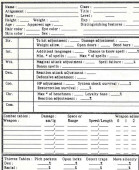Yet, another ship, this time based on the 1977 Traveller rule set. This is a 400 ton freighter. The Devil Fish is a converted warship. As a warship, it was horrible. It was meant for planetary bombardment, but it lacked the fuel pods shown on this refit. It had just enough fuel for 2 jumps and 2 hours of operations. You could end up trapped in a system you just bombarded. None of these ships saw combat, thankfully.
This freighter version is outfitted with larger fuel tanks which is slightly more practical. The two long beams are where the missiles used to be. In the refit, these long tubes were simply sealed up. The crew calls them "Industrial Accident Site, Port and Starboard", because they lack the funds to put anything in there. It's a long open chamber, completely devoid of any safety features. There is a brass sign with the names of 5 crew members who have been killed and a longer list of names of people merely injured.
While creating the files for this ship, I made a typo that made me think of an interesting crew feature.
This freighter version is outfitted with larger fuel tanks which is slightly more practical. The two long beams are where the missiles used to be. In the refit, these long tubes were simply sealed up. The crew calls them "Industrial Accident Site, Port and Starboard", because they lack the funds to put anything in there. It's a long open chamber, completely devoid of any safety features. There is a brass sign with the names of 5 crew members who have been killed and a longer list of names of people merely injured.
While creating the files for this ship, I made a typo that made me think of an interesting crew feature.
The current crew likes to gamble and won big at the table. It turns out the other gambler didn't actually have all of the funds to support his bet. In lieu of cash, he had a guy who could get the crew name plates for the ship, matching leather jackets and jumpsuits plus some extra patches, complete with names and logos for the ship.
Unfortunately, the crew thought he was faking an accent but he wasn't. Instead of logos with a manta ray logo and the name "The Devil Fish" they got a green devil's head and the word "Devilish".
Unfortunately, the crew thought he was faking an accent but he wasn't. Instead of logos with a manta ray logo and the name "The Devil Fish" they got a green devil's head and the word "Devilish".
Since the ship is registered as "The Devil Fish", mistakes have been made in the crew's favor. Such as escaping security and not paying for goods loaded on board. The name plates are visible only when the airlocks are closed. They objected at first, but once they realized what was happening, the merely hate these details with a passion. It doesn't stop them from using them to run hustles and scams.
It's such a strange detail, it sounds like it could actually happen.
Edited - to add the Military variant, with no tanks.























